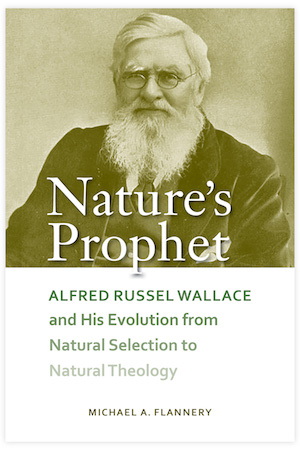
Science historian Michael Flannery, whose specialty is the life and work of Alfred Russel Wallace, published a book recently, Nature’s Prophet: Alfred Russel Wallace and His Evolution from Natural Selection to Natural Theology
The book was attacked as follows:
Flannery’s conclusion that Wallace ended up a natural theologian is reasonable, except in one regard. In the literature on the history of evolutionary thought, the term is most closely associated with William Paley’s explicitly Christian championing of the idea of exploring the Works of God in order to understand the Mind of God. There is nothing remotely Christian about Wallace’s teleology. In fact, he carefully disavows Christianity, insisting in his conclusion to The World of Life that postulating “the Infinite and Eternal Being as the one and only direct agent in every detail of the universe seems, to me, absurd; his is the spiritualist’s universe, entailing “infinite grades of influence of higher beings upon lower” (400). Flannery, however, does not want to lose sight of Paleyan natural theology, pointing out, for example, that Wallace established “a human-centered cosmology that resonates with much of scripture” (118). What is the relevance of this? That Flannery’s previous book on Wallace, Alfred Russel Wallace: A Rediscovered Life (2011), was published by the anti-evolution Discovery Institute, is telling. Wallace’s particular appeal to proponents of intelligent design creationism is that very strand of teleological thinking that Romanes condemned for its “incapacity and absurdity” (88).
Andrew Berry, “[review] Michael A. Flannery. Nature’s Prophet: Alfred Russel Wallace and His Evolution from Natural Selection to Natural Theology” at Journal of British Studies
Flannery responds,:
Berry claims, “There is nothing remotely Christian about Wallace’s teleology.” This is nonsense. I plainly point out throughout the book that Wallace was not a Christian. Nevertheless, Wallace never disavowed Christianity generally, only Christianity of a particular kind, namely, a Paleyan interventionist view that had God tinkering with nature at every hand. I make this point in reference to Wallace’s reply to the Duke of Argyll’s Reign of Law (p. 50). Wallace instead saw nature as guided by an “infinite number of intelligent beings who may exist in the universe between ourselves and the Deity.” He added, “Call them spirits, angels, gods, what you will; the name is of no importance.”
Christians of Wallace’s own generation understood this.
Michael Flannery, “Why Nature’s Prophet Had to be Written” at Evolution News and Science Today:
But where this gets really interesting is that Berry, a Harvard revolutionary biologist, is in a very poor position to be throwing out ad hominem attacks about Flannery’s association with Discovery Institute:
But what about Berry who co-authored with James D. Watson, DNA: The Secret of Life (2003)? While I’m sure Berry would not endorse the extremist views of Watson, it is nonetheless true that his co-author is a known racist who was forced to apologetically step down in 2007 from his position at the Cold Spring Harbor Laboratory. I only mention this because Berry himself opened the door to this “guilt by association” strategy, and I’ll take Discovery Institute’s honest search for truth and support for open inquiry over the bigotry of Watson any day.
Michael Flannery, “Why Nature’s Prophet Had to be Written” at Evolution News and Science Today
Hey, we could be punished for noticing that.
Never mind. Reward yourself with Flannery’s book on Wallace, a serious thinker on evolution.